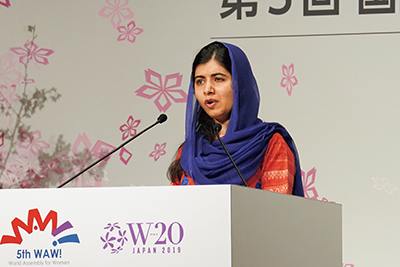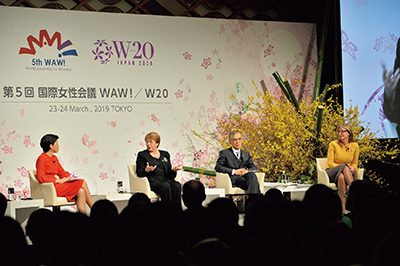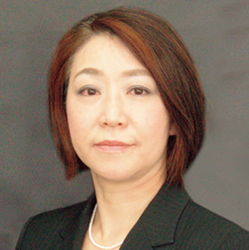Diplomatic Bluebook 2019
Chapter 3
Japan's Foreign Policy to Promote National and Global Interests
8 Women
(1) G7 Charlevoix Summit
At the G7 Charlevoix Summit (Canada), gender was taken up as a cross-cutting theme. The Summit Communiqué affirmed continuation of efforts toward gender equality, and there was adoption of the “Declaration on Quality Education for Girls, Adolescent Girls and Women in Developing Countries” and the “Commitment to End Sexual and Gender-Based Violence, Abuse and Harassment in Digital Contexts.” Japan took this opportunity to announce support of 200 million U.S. dollars for high-quality education and human resources training support for girls, adolescent girls, and women in developing countries.
(2) G20 Buenos Aires Summit
At the G20 Buenos Aires Summit (Argentina), there were discussions regarding women's empowerment from viewpoints including promotion of women's labor participation, eliminating the gender gap in participation in digital and science fields, access to jobs and childcare leave, and continuous support for women entrepreneurs. The Leaders' Declaration incorporated text welcoming continued implementation of the Women Entrepreneurs Financing Initiative (We-Fi), whose launch was announced at the G20 Hamburg Summit (Germany) in July 2017 and to which Japan has contributed 50 million U.S. dollars.
(3) World Assembly for Women (WAW!)
Japan has held the World Assembly for Women (WAW!) since 2014 to communicate, both domestically and abroad, Japan's initiatives for promoting women's empowerment, and to provide an opportunity for discussions regarding various matters concerning women by top leaders from Japan and abroad who are active in pioneering politics, economics, and social fields. The 5th WAW! was held in March 2019 concurrently with the W20, one of the G20 engagement groups (groups composed of stakeholders from the international community that are independent of governments).
The theme of the 5th WAW! was “WAW! for diversity,” and discussions were centered on women's viewpoints regarding current issues faced by modern Japanese society and the international community, under the recognition that it is important to incorporate diverse viewpoints toward realizing a sustainable, diverse, and inclusive society that “leaves no one behind,” which is stated in the Sustainable Development Goals (SDGs). Discussion topics included “Leadership for Regional Development and Job Creation,” “Media and Contents to Nurture Diversity,” “Women's Participation in Conflict Prevention, Peacebuilding and Post Conflict Recovery,” “Diversity for Growth: Corporate Management and Working Environment,” and “Future of Family: Getting Support, Utilizing and Sharing.”
 Malala Yousafzai giving a speech at the Fifth World Assembly for Women (WAW!) (March 23, 2019, Tokyo)
Malala Yousafzai giving a speech at the Fifth World Assembly for Women (WAW!) (March 23, 2019, Tokyo) Photograph of a discussion at the Fifth World Assembly for Women (WAW!) (March 23, 2019, Tokyo)
Photograph of a discussion at the Fifth World Assembly for Women (WAW!) (March 23, 2019, Tokyo)In addition, there were discussions at the W20 regarding “Closing the Gender Gap for New Prosperity: Enhancing Governance for Women's Empowerment,” “Creation of New Market Value by Women Entrepreneurs,” “Gender Lens Investing: Emerging Global Trends,” “Towards the Gender Equality in the Digital Era,” “Women as Patients and Caregivers: Improving Gender Equity and Labor Inclusion by Addressing Healthcare Disparities,” and “Closing the Gender Gaps at Work: Leading a Happy Work and Life.”
(4) International Cooperation for the Empowerment of Women in Developing Countries
In May 2016, Prime Minister Abe announced the “Development Strategy for Gender Equality and Women's Empowerment,” formulated as one of the new thematic policies under the Development Cooperation Charter, and declared that measures would be implemented to train about 5,000 female government administrative officials and to improve the learning environment for about 50,000 girls over the three years from 2016 to 2018. This was steadily implemented. At the Third World Assembly for Women (WAW! 2016) held in December 2016, Prime Minister Abe promised to provide support amounting to more than 3 billion U.S. dollars for women in developing countries until 2018 focusing on: (1) promoting women's and girls' rights; (2) creating an enabling environment for women and girls to reach their full potential; and (3) advancing women's leadership in politics, economics, and other public fields. These measures were steadily implemented. In addition, support was announced for 200 million U.S. dollars for high-quality education and human resources training support for girls, adolescent girls and women in developing countries at the G7 Charlevoix Summit.
(5) Initiatives in the UN
A United Nations Commission on the Status of Women
The 62nd session of the United Nations Commission on the Status of Women was held in March, and Japan sent a delegation consisting of Parliamentary Vice-Minister of Cabinet Office Yamashita as the Chief Delegate, Japan Representative Yumiko Tanaka, representatives from various government ministries, the Japan International Cooperation Agency (JICA), and NGOs. At the conference, there were discussions on the priority theme of “challenges and opportunities in achieving gender equality and the empowerment of rural women and girls.” In her remarks during the General Discussion, Representative Tanaka appealed for domestic initiatives for promotion of family management agreements with decisions on salaries and days off based on family discussions, and introduced international support such as gender awareness activities in Africa. At the ministerial round table, she emphasized the importance of efforts toward eliminating violence against all women including women in agricultural communities and regions.
B UN Women
Japan contributed approximately 23.66 million U.S. dollars in 2018 to UN Women and the contributions are used in ways such as empowering Syrian refugee women (enhancing their capabilities and social position) and measures to counter violent extremism in Africa. UN Women has been implementing the HeForShe Campaign to call for the involvement of men and boys in gender equality. Prime Minister Abe was selected as one of ten champions to accelerate the campaign. Japan will continue to deepen its cooperation with UN Women.
C Dealing with sexual violence
Sexual violence as a tactic of war must not be overlooked, and it is important to put an end to impunity for perpetrators and to support victims of violence. To make the 21st century a world with no human rights violations against women, Japan is actively engaging in efforts in this field, and places importance on cooperating with international organizations including UN Action and Office of the Special Representative of the Secretary-General on Sexual Violence in Conflict, as well as participating in international discussions.
In 2018, Japan provided financial support of 1.1 million U.S. dollars to the Office of the Special Representative of the UN Secretary-General on Sexual Violence in Conflict, contributing to strengthening the police and judicial capabilities of Iraq and countries in the Middle East and Africa. Furthermore, Japan continues to make voluntary contributions to the Trust Fund for Victims of the International Criminal Court (ICC), earmarking approximately 550,000 Euros out of a cumulative contribution of about 750,000 Euros for victims of sexual and gender-based violence. Through such contributions, Japan engages in efforts to support victims of sexual violence in conflicts.
D Women, Peace and Security (WPS)
In order to realize a peaceful society more effectively, it is important to secure women's participation in all stages in conflict prevention, conflict resolution, and peace keeping and peacebuilding with integration of gender perspective. Japan formulated a national action plan in 2015 to implement UN Security Council Resolution 1325 and other relevant resolutions on women, peace and security. The action plan has been effective since 2016, and monitoring and evaluating of the implementation is conducted. As a result, the second annual report was published in July 2018. The plan also clearly targets a revision to be conducted in three years following its formulation, and the revised version was formulated in March 2019. In accordance with the national action plan, Japan has made contributions in the WPS field through financial supports to international organizations, mainly UN Women and the UN Office of the Special Representative of the Secretary-General on Sexual Violence in Conflict. At the G7 Toronto Foreign Ministers' Meeting in Canada in 2018, the G7 foreign ministers agreed to establish the G7 Women, Peace and Security Partnerships Initiative. With Sri Lanka as its partner country, Japan will contribute to implementing the WPS field in Sri Lanka from 2019.
E Committee on the Elimination of Discrimination against Women
Since 1987, Japan has continued to provide members for the Committee on the Elimination of Discrimination against Women (CEDAW). At the 20th meeting of the States Parties to the Convention on the Elimination of All Forms of Discrimination against Women held at the UN Headquarters in New York in June 2018, there was an election for the members of the CEDAW and Professor Hiroko Akizuki of Asia University was elected to a member of the Committee.
On my selection to be a member of the Committee on the Elimination of Discrimination against Women
Hiroko Akizuki, Professor, Asia University

2018 marked the 70th anniversary of the adoption of the Universal Declaration of Human Rights, while 2019 marked the 40th anniversary of the adoption of the Convention on the Elimination of All Forms of Discrimination Against Women. I feel highly honored to have been elected to be a member of the Committee on the Elimination of Discrimination against Women (CEDAW) in these important years and to have begun this work.
My hope is to build a world in which all women and girls can choose for themselves their desired way of life and become who they want to be. However, even 40 years after the adoption of the Convention, women continue to face discrimination around the world. I want to contribute to revealing the nature of the problem from the perspective of de facto equality, not just legal equality, and ensure substantial and effective implementation of the Convention.
The main mission of CEDAW is assessing reports submitted by signatory countries to review their progress in implementation of the Convention. Signatory countries are primary agents in carrying out the Convention, while CEDAW members provide assistance to their implementation. As a member, I aim to listen carefully to updates from signatory countries on the status of implementation of the Convention in their countries, and difficult problems if any exist. At the same time, I intend to discuss and communicate with each signatory country through constructive dialogues that women and girls also possess rights and therefore it is necessary to empower women and girls by providing education on rights and freedom, and to ensure participation of women in policy decisions to adequately reflect the opinions of women. Furthermore, I will strive to present balanced and fair opinions by obtaining sufficient information through dialogue with civil society and directly hearing from women and girls.
As a CEDAW member, I will make efforts so that I can contribute to building a free and equal society in terms of dignity and rights for everyone, and especially women and girls.

